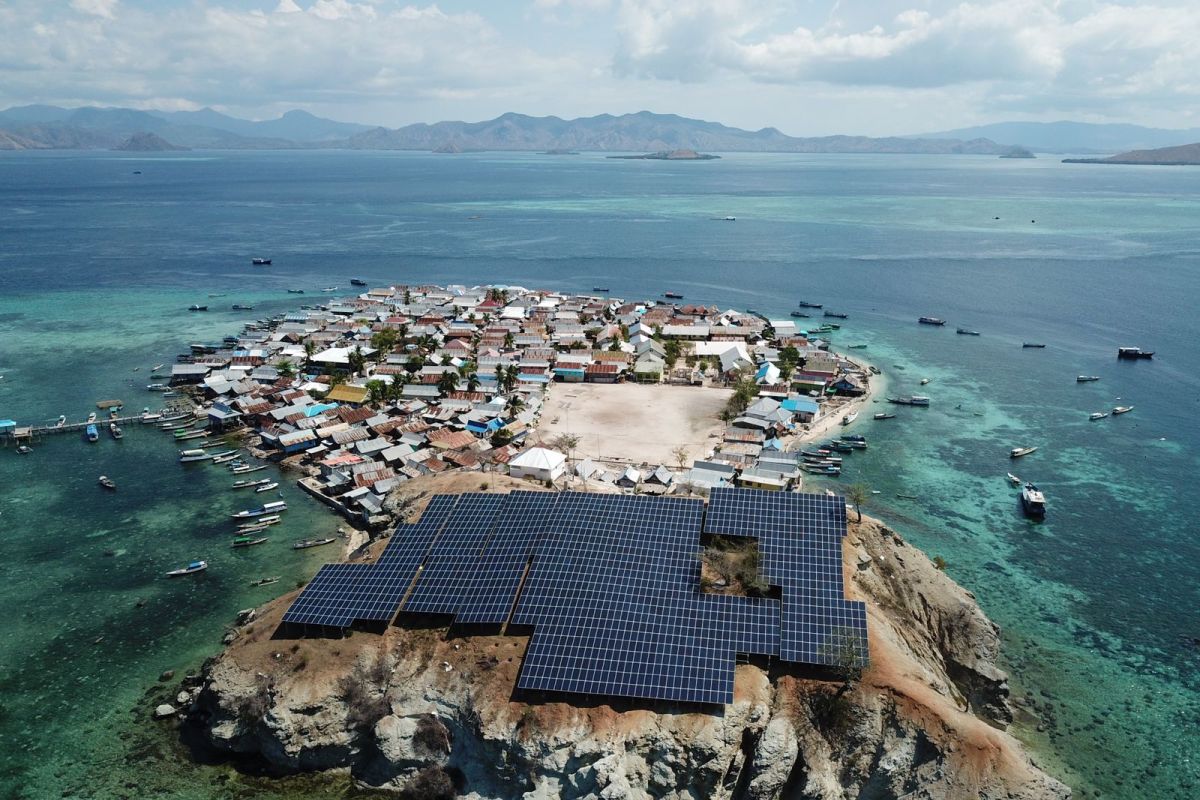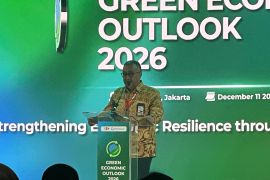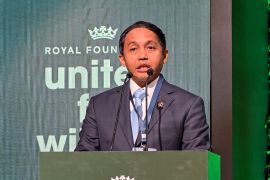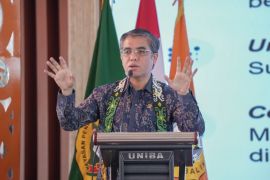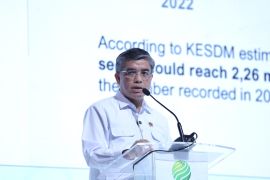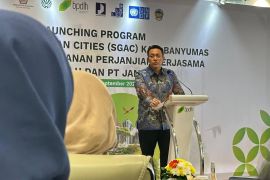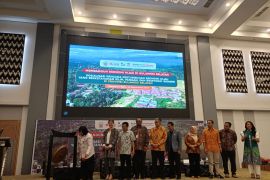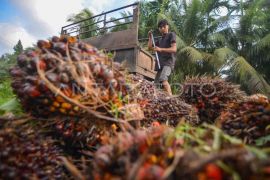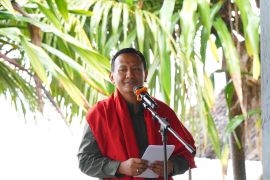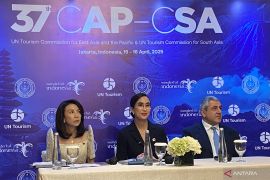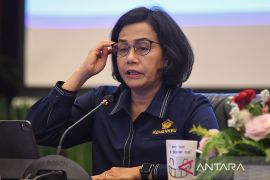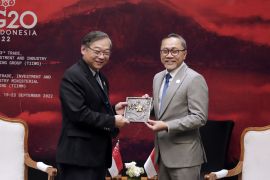However, various challenges have to be faced and mitigated. One of the emerging challenges is climate change, which is a threat to human life and will have an impact on the economy.
The government is aware of the threat from climate change and has prepared a Green Growth Program.
In the Nationally Determined Contributions (NDC) document to The United Nations Framework Convention on Climate Change (UNFCCC), Indonesia targets to reduce greenhouse gas emissions through its own efforts by 29 percent.
The aspect of climate change is the sixth national priority that is being accorded through, firstly, reducing greenhouse gas emissions with international support from the business-as-usual scenario in 2030 – up to 41 percent.
Third, the priority of improving environmental quality with the index target in 2024 reaching 73.25 - 75.25.
Thereafter, increasing disaster resilience and climate change that seeks to reduce the ratio of economic losses due to disasters and climate hazards to GDP by 0.21 percent in 2024.
Related news: Green economy to create 4.4 million new jobs: Bappenas
Related news: Indef highlights private sector's role in green economy development
In addition, the government readies employment in the green economy sector through provision of green jobs that are spread across various sectors.
The agricultural, tourism, and energy sectors have the potential to provide green jobs.
Head of the Integrated Financial Services Sector Policy Group of the Financial Services Authority (OJK), Enrico Hariantoro, delivered the statement at Indonesia's Green Jobs Conference webinar held recently.
During the pandemic, Hariantoro affirmed that the agricultural sector had recorded positive growth during the pandemic, and the millennial generation had shown interest in the sector.
With regard to the tourism sector, the Ministry of Tourism and Creative Economy (Kemenparekraf) has forecast that ecotourism and wellness tourism products will be manufactured that can absorb workers.
Meanwhile, director of manpower at the National Development Planning Ministry, Mahatmi Parwitasari Saronto, stated that investment in the green economy sector could create seven to 10 more job opportunities than the conventional economy sector.
The green economy sector is considered as being more labor-intensive owing to renewable energy development, electric vehicle industries, and improved waste management, she pointed out.
However, despite its huge potential, employment in the sector still poses various challenges, such as the absence of an agreeable definition of green jobs that can be used consistently, especially for policy-making, she noted.
Moreover, Indonesia lacks quality human resources for green jobs due to limited education and training in the skills required in the green economy sector, Saronto remarked.
A green economy can generate inclusive and sustainable economic growth, Saronto affirmed. Thus, it can help Indonesia escape from the middle-income trap and emerge as a high-income country by 2045, she highlighted.
While implementing a green economy, the Indonesian government will also implement low-carbon development that will not only boost economic growth but also reduce carbon emissions by 27.3 percent by 2024, Saronto stated.
Low carbon development will be implemented through the five main strategies of waste management and circular economy implementation, green industry development, sustainable energy development, low carbon marine and coastal development, as well as sustainable land restoration, she added.
However, currently, Indonesia is still facing several challenges in its path to transitioning to a green economy, such as limited access to green economy funding and technology transfer, Saronto pointed out.
Hence, the government is striving to forge more international cooperation, which will be beneficial for all parties and in accordance with Indonesia's national goals to establish green industries and achieve net-zero carbon emissions by 2060, she stated.
Policy framework
The Indonesian Government is optimizing the green economy transition by creating a systemic green policy framework, deputy for economic affairs at National Development Planning Agency (Bappenas) Amalia Widyasari said.
The government has a strategy to optimize the transition to a green economy, firstly through the establishment of a systemic green policy framework, she said.
This systemic green policy framework starts from the formulation of coherent inter-ministerial and institutional policies to the preparation of a financing plan for green economy.
This is also not enough from the state budget, but also requires private sector mobilization and public awareness to lead to a green business model, Widyasari said.
The government is also optimizing the green economy transition in terms of financing so that business infrastructure in the capital market can also lead to a green economy.
Currently, the Financial Services Authority (OJK) has also issued a green taxonomy, meaning that the financial sector should also fund green or environmentally friendly economic projects as much as possible, she added.
Furthermore, to optimize the transition to a green economy, the government has continued to educate the public that implementing a green economy will not correct the economic stretch.
But its implementation can actually be seen as a potential source of economic growth, she said.
The government will also create tools to measure the progress and impact of implementing more environmentally friendly activities on economic growth and community welfare, Widyasari said.
"I think it is important that we put in the right performance indicators. In the future, this is to measure how much progress the implementation of the green economy has made in Indonesia," she added.
Meanwhile, Indef researcher Nailul Huda said that business actors can play a crucial role in helping the government make the transition to a green economy,
The green economy transition includes the use of more environmentally-friendly energy and industry, he said.
The transition has been encouraged by the global community lately as an effort to address climate change.
The business world can play a huge role in the development of a green economy. Therefore, the government should make maximum efforts to encourage business actors to take part in the green transition, he stressed.
The key to maximizing the participation of the private sector in green economy development lies in the provision of incentives by the government, he explained.
As long as government incentives are sufficient to reduce the costs borne by business actors to shift to green economic practices, interest in the development of green industry and energy among business actors will remain high.
Related news: Investment in green economy to create up to 10 more jobs: ministry
Related news: Optimizing green economy transition through systemic policies: gov't
Editor: Sri Haryati
Copyright © ANTARA 2022
